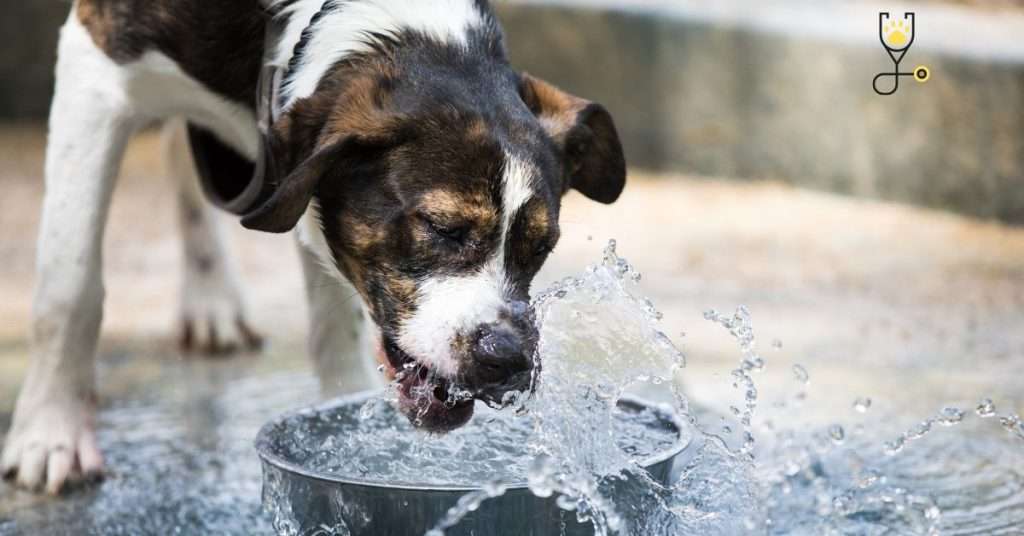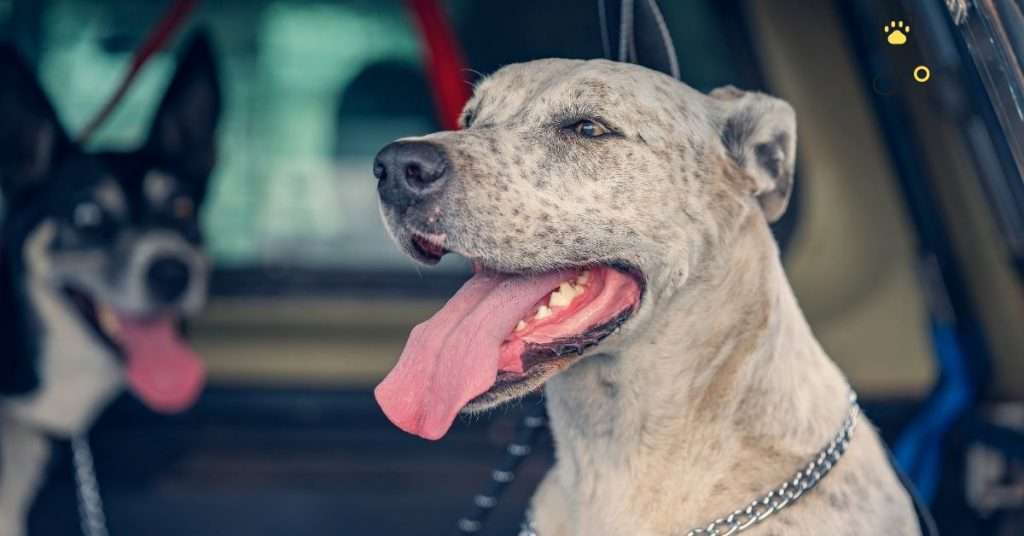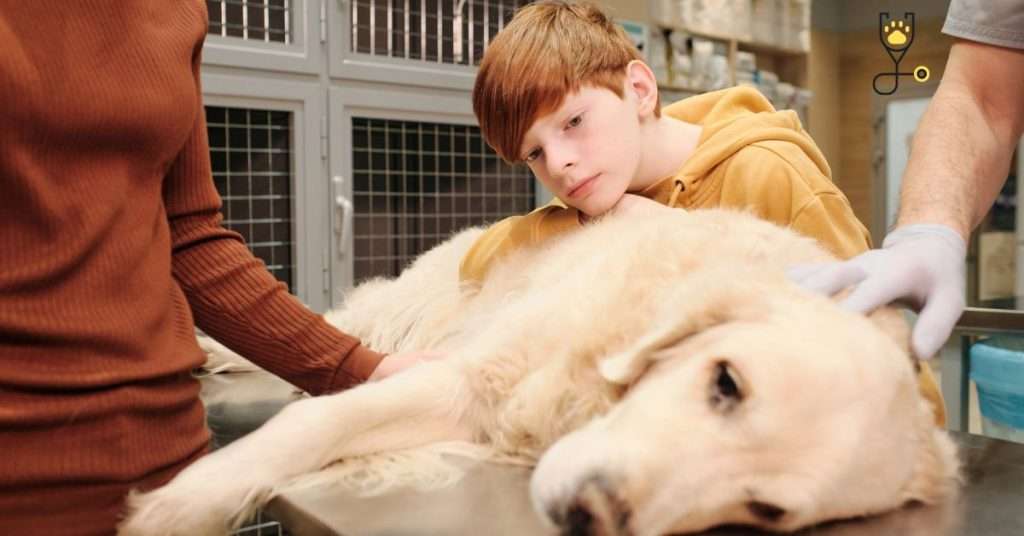Dogs love to go for walks, and many pet owners take their furry friends on long hikes or runs. It’s natural for a dog to want to run and get exercise, but did you know that some dogs collapse after exercising? If your dog has ever had a seizure-like episode after a workout, it’s important to understand the causes and treatment options. In this blog post, we’ll discuss why dogs collapse after exercise and what you can do to help keep your pup safe.
Learn More: What Is the Natural Diet of a Dog in the Wild?
What are the causes of collapse in dogs during exercise?

There are many possible causes of collapse in dogs during exercise.
Exercise-induced collapse(EIC)
Exercise-induced collapse(EIC) is a genetic condition that can affect any dog but is most commonly seen in young, athletic breeds like Labrador Retrievers, Golden Retrievers, and Border Collies. The exact cause of EIC is unknown, but it is believed to be related to a genetic mutation that affects the way the dog’s body regulates its blood sugar levels. This can cause the dog to become weak and dizzy during periods of strenuous activity, and can eventually lead to collapse.
Learn more about Exercise Induced Collapse and the it’s prognosis here.
Dehydration:
Dehydration is a common cause of the collapse in dogs during exercise. Dogs can lose a lot of water through panting and sweating, and if they don’t drink enough water to replace what they’ve lost, they can become dehydrated. If your dog is panting heavily or seems lethargic after exercising, give them a drink of water and see if they improve.
Overheating:
Panting helps dogs cool off, but if they are overheated, they may not be able to pant effectively. This can cause them to collapse. If it’s hot outside or your dog has been exercising vigorously, be sure to offer them plenty of water and find a shady spot for them to rest in.
Heart conditions:
Some dogs have heart conditions that can cause them to collapse during exercise. If your dog has a heart condition, talk to your veterinarian about how much exercise is safe for them.
Low blood sugar:
Low blood sugar, or hypoglycemia, is another possible cause of the collapse in dogs during exercise. This can happen if your dog hasn’t eaten in a while or if they have an underlying medical condition that causes their blood sugar to drop. If you think your dog’s blood sugar might be low, give them a small snack and see if they improve.
Injuries:
Injuries can also cause dogs to collapse during exercise. If your dog hurts themselves while playing or running, they may need to rest and recover before continuing.
Read More About: prevent my dog from heat stroke
How can you tell if your dog is about to collapse?
There are some signs that you can look for that may indicate your dog is about to collapse.
-Panting: If your dog is panting heavily, it may be a sign that they are overheated or dehydrated.

-Lethargy: If your dog seems tired or lethargic, it may be a sign that they are not getting enough oxygen to their muscles.
-Stumbling: If your dog stumbles or seems uncoordinated, it may be a sign that they are injured or have low blood sugar.
If you see any of these signs in your dog, offer them water and a rest in a cool, shady spot. If they don’t improve after a few minutes, call your veterinarian.
Read More: My Dog Won’t Eat Food in the Morning, Help Me!
What are the treatment options for a collapsed dog?
- If your dog has collapsed, it is important to seek veterinary care immediately. Depending on the cause of the collapse, there are a variety of treatment options that may be recommended.
- If the collapse is due to an underlying medical condition, such as heart disease or hypoglycemia (low blood sugar), treatment will focus on managing the underlying condition. This may involve prescribing medication, changing your dog’s diet, and/or providing supplemental oxygen therapy.
- If the collapse is due to heat stroke or exhaustion, immediate cooling measures will need to be taken. This may involve placing your dog in a cool bath, using cool towels, and/or giving your dog cool water to drink. If your dog’s temperature does not come down within a few minutes, veterinary care will be required.
- In some cases, collapsed dogs may need to be hospitalized for treatment. This is typically the case when the cause of the collapse is unknown or when there are concerns about your dog’s ability to recover without 24-hour monitoring and care.

Preventing collapses in dogs during exercise
There are some things you can do to help prevent your dog from collapsing during exercise.
-Offer plenty of water: Make sure your dog has access to fresh water at all times, especially before and after exercising.
– Avoid hot weather: If it’s hot outside, exercise in the early morning or evening when it’s cooler. Take breaks often and offer your dog water frequently.
– Know your dog’s limits: Don’t push your dog to exercise beyond their abilities. If they seem tired or sluggish, take a break.
– Talk to your veterinarian: If your dog has any underlying medical conditions, talk to your veterinarian about how much exercise is safe for them.
Prognosis
The prognosis for dogs who have collapsed during exercise is generally good. Most dogs will make a full recovery with proper treatment. However, it is important to seek veterinary care immediately if your dog has collapsed as they may need emergency medical care.
If your dog has underlying medical conditions that cause them to collapse, such as heart disease or hypoglycemia, the prognosis will depend on the severity of the condition. Dogs with milder conditions may be able to live relatively normal lives with medication and/or dietary changes, while those with more severe conditions may require lifelong treatment and monitoring.
Read More: How to massage your dog and puppy?
Conclusion
If your dog collapses during exercise, it is important to seek veterinary care immediately. In most cases, collapsed dogs will make a full recovery with proper treatment. However, underlying medical conditions can be more serious and may require lifelong management. talk to your veterinarian about how to best care for your dog to help prevent future collapses.
Learn All About Common Health Issues in Dogs & Their Prevention in our detailed guide here.
FAQs
Why did my dog collapse during exercise?
There are a number of potential causes of collapse in dogs during exercise. Some of the most common include heat stroke, exhaustion, low blood sugar (hypoglycemia), and heart disease.
How can I prevent my dog from collapsing during exercise?
There are some things you can do to help prevent your dog from collapsing during exercise. Offer plenty of water, avoid hot weather, know your dog’s limits, and talk to your veterinarian about any underlying medical conditions.
What is the prognosis for dogs who have collapsed during exercise?
The prognosis for dogs who have collapsed during exercise is generally good. Most dogs will make a full recovery with proper treatment. However, it is important to seek veterinary care immediately if your dog has collapsed as they may need emergency medical care. If your dog has underlying medical conditions that cause them to collapse, such as heart disease or hypoglycemia, the prognosis will depend on the severity of the condition. Dogs with milder conditions may be able to live relatively normal lives with medication and/or dietary changes, while those with more severe conditions may require lifelong treatment and monitoring.
How can I prevent my dog from collapsing during exercise?
There are some things you can do to help prevent your dog from collapsing during exercise. Offer plenty of water, avoid hot weather, know your dog’s limits, and talk to your veterinarian about any underlying medical conditions.